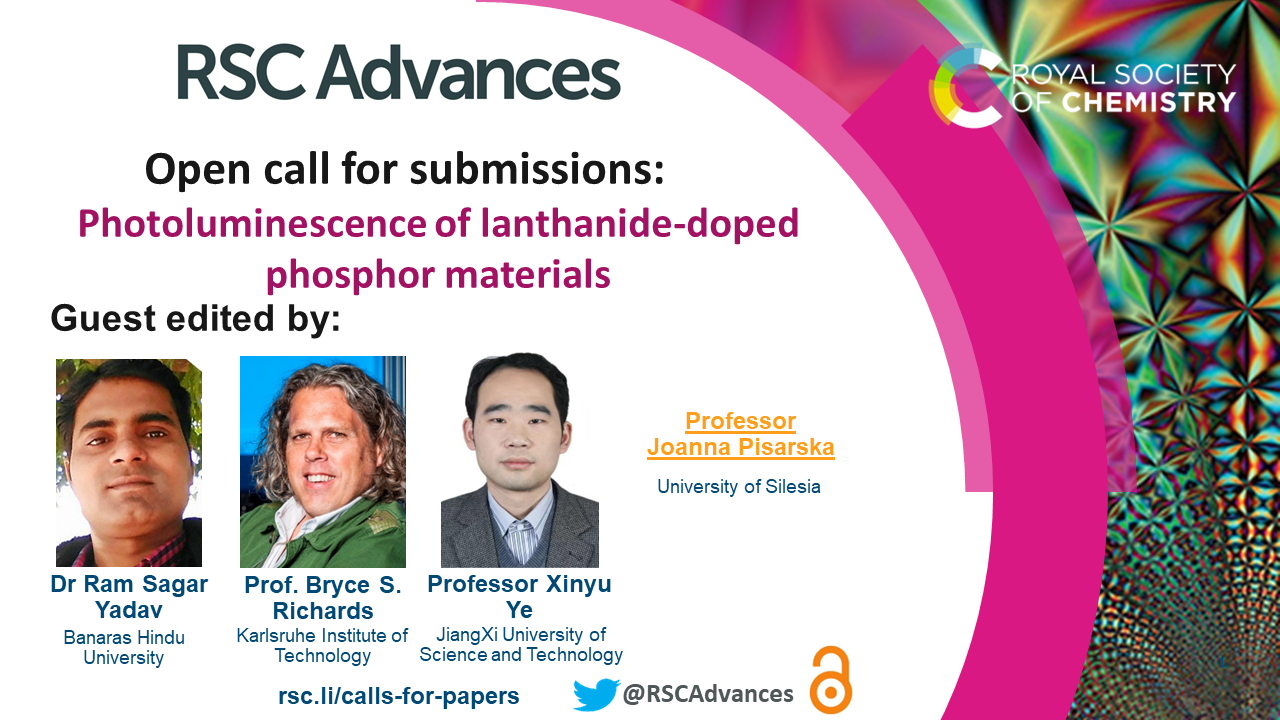RSC Advances is delighted to announce a new themed collection titled ‘Photoluminescence of lanthanide-doped phosphor materials’. This collection is Guest Edited by Dr Ram Sagar Yadav (Banaras Hindu University), Prof. Bryce S. Richards (Karlsruhe Institute of Technology), Professor Joanna Pisarska (University of Silesia) and Professor Xinyu Ye (JiangXi University of Science and Technology).
Scope:
The aim of this collection is to focus on the synthesis, as well as the structural and optical properties, of different types of lanthanide-doped phosphor materials, such as phosphors, nano-phosphors and phosphor composites. This collection welcomes primary research articles as well as review articles, related to the synthesis, characterization and applications of different types of the lanthanide-doped phosphor materials.
The lanthanide ions can produce multicolor photoluminescence, and contain various distinct energy levels in which some are meta-stable. Each energy level can be excited with a certain excitation wavelength, with the emitted light of lanthanide ions covering emissions in the ultraviolet, visible and near infrared regions. Due to the various properties of lanthanide ions, lanthanide-doped phosphor materials can be utilised for different technological applications in various fields, such as display devices, red-green-blue (RGB) emitting materials, light emitting diodes (LEDs), phosphor-converted LEDs (pc-LEDs), white LEDs, solar cell, optical heating, temperature sensing and bio-imaging.
Lanthanide ions also enable upconversion (UC) and downconversion (DC) of photons. The UC process is helpful for measuring the temperature sensing sensitivity of different phosphor materials, as it depends on the fluorescence intensity ratio (FIR) of the two thermally coupled (TC)/non-thermally coupled (NTC) emitting levels. In these cases, the emission intensity of one level is found to increase while that of the other decreases when the external temperature of the sample is increased, and vice-versa. This generates lattice vibration in the host lattice, which initiates a shift in the population of the excited ions from one level to the other. The plot between FIR-based sensitivity and external temperature gives temperature sensing, which can be examined in the other lanthanide-doped phosphor materials.
The aim of this collection is to focus on the synthesis, as well as the structural and optical properties, of different types of lanthanide-doped phosphor materials, such as phosphors, nano-phosphors and phosphor composites. This collection welcomes primary research articles as well as review articles, related to the synthesis, characterization and applications of different types of the lanthanide-doped phosphor materials.
Topics include but are not limited to the following:
- Advanced materials for wastewater treatment and desalination
- Synthesis of green nanomaterials
- Advanced nanocomposites from waste resources
- Nanocomposite modification and functionalization
- Computational studies of nanocomposite materials
- Life-cycle analysis of nanocomposite materials
How to submit:
Both Papers and Review articles will be considered for this issue. All submissions will be subject to an initial assessment by Associate Editors and, if suitable for the journal, they will be subject to rigorous peer review to meet the usual high standards of RSC Advances.
Our APC is among the lowest in the industry and there are no submission charges. Discounts and waivers are offered to authors from developing countries.
If you would like to submit to this issue the manuscript should be prepared according to our article guidelines and submitted via our online system anytime before the submission deadline of 30 January 2023. During submission, authors will be asked if they are submitting for a themed collection and should include the name of the themed collection. If you would like to submit but require additional time to prepare your article, please do let us know by contacting the journal.
 Submit to RSC Advances today! Check out our author guidelines for information on our article types or find out more about the advantages of publishing in a Royal Society of Chemistry journal.
Submit to RSC Advances today! Check out our author guidelines for information on our article types or find out more about the advantages of publishing in a Royal Society of Chemistry journal.
Keep up to date with our latest Popular Advances, Reviews, Collections & more by following us on Twitter. You can also keep informed by signing up to our E-Alerts.











